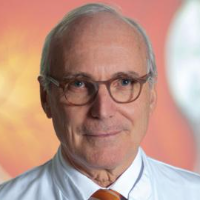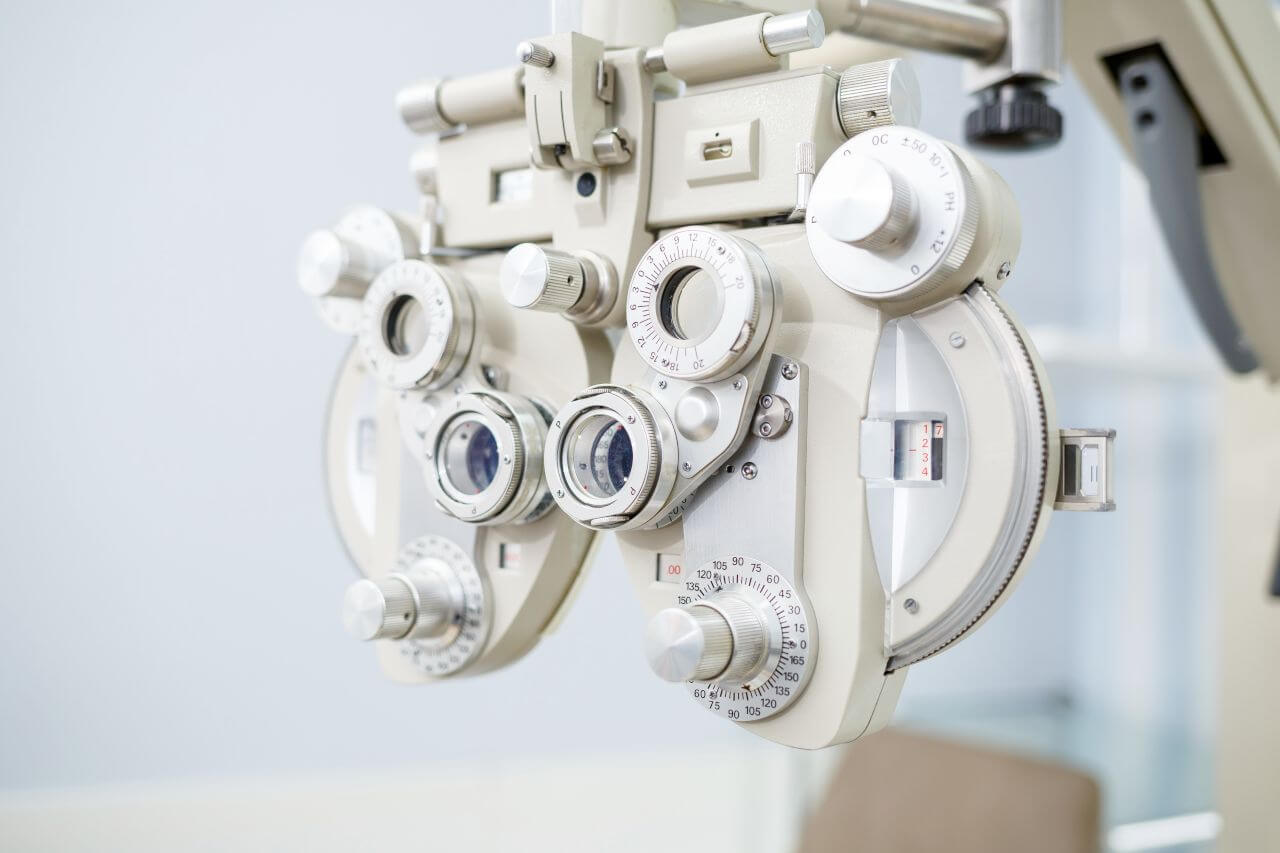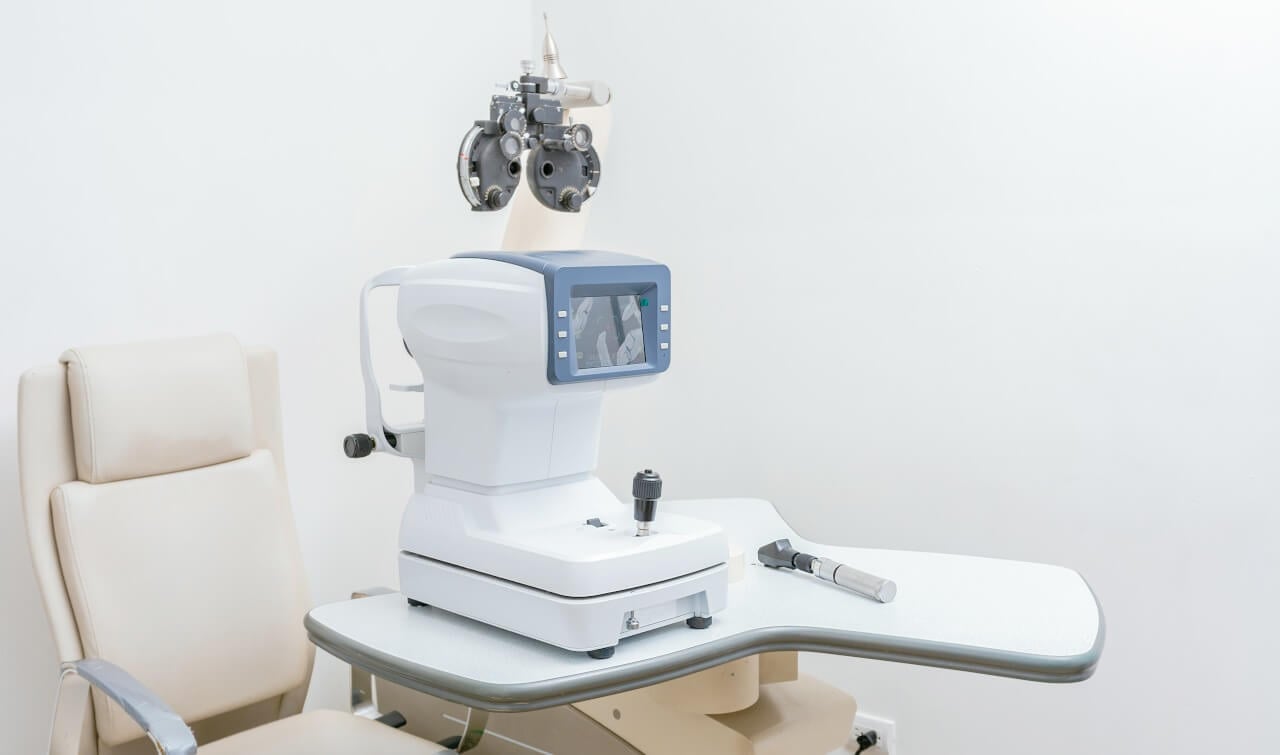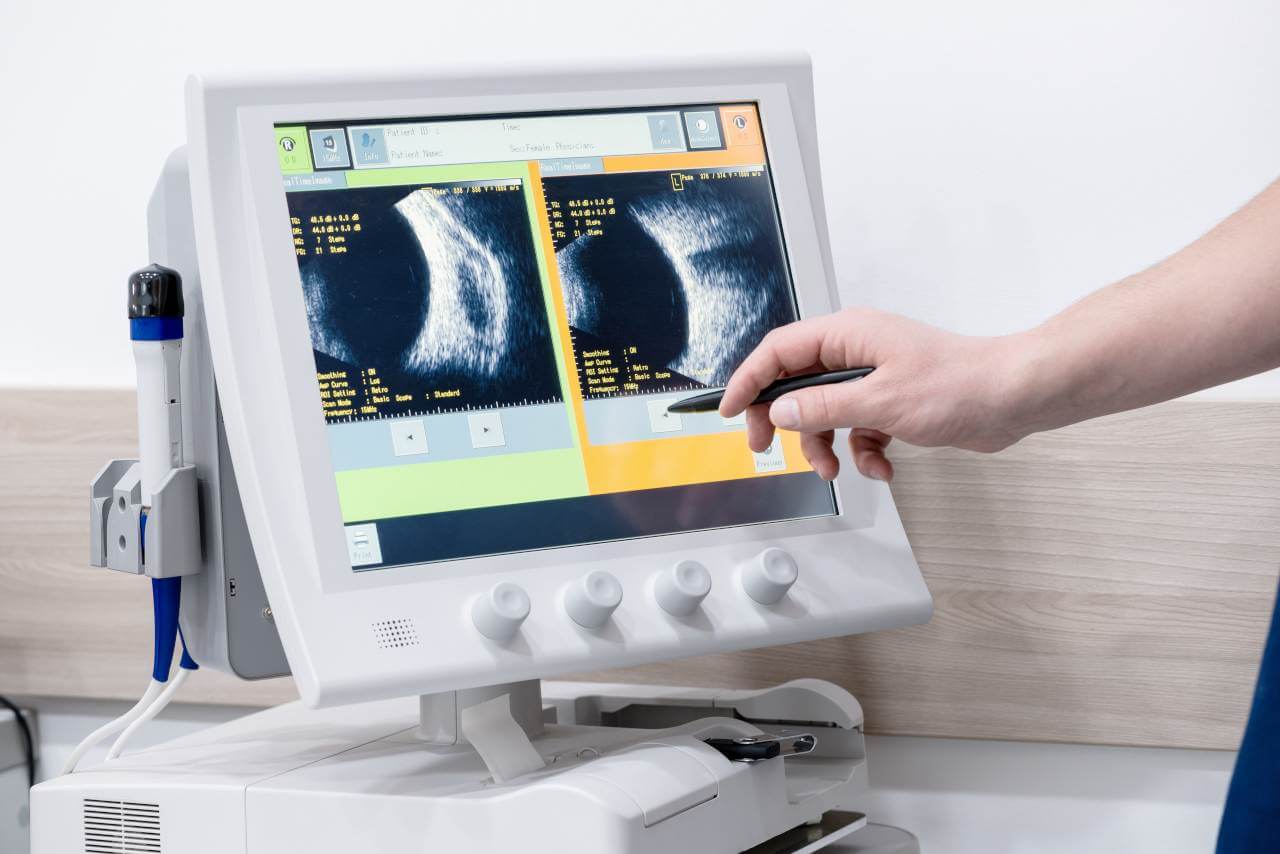
The program includes:
- Initial presentation in the clinic
- clinical history taking
- review of medical records
- physical examination
- ophthalmologic examination:
- slit-lamp examination
- pupil function tests
- ocular motility test
- ophthalmoscopy
- perimetry (visual field test)
- computer perimetry
- visometry (without correction and with correction)
- keratometry
- pachymetry
- refractometry (objective, subjective, cycloplegic)
- autorefractometry
- non-contact tonometer
- biomicroscopy
- fluorescein angiography (on indication)
- photokeratoscopy
- laser doppler retinal vessels
- electron microscopy of retinal capillaries
- laboratory tests:
- complete blood count
- biochemical analysis of blood
- blood coagulation analysis (aPTT, PT, INR)
- inflammation indicators (CRP, ESR)
- metabolic status (uric acid, total glucose, HbA1c)
- kidney function test (creatinine, urea)
- preparation according to preoperative standard
- laser retina coagulation
- symptomatic treatment
- control examinations
- nursing services
- treatment by chief physician and all leading experts
- explanation of individual treatment plan
Required documents
- Medical records
- Optical coherence tomography (if available)
Service
You may also book:
 BookingHealth Price from:
BookingHealth Price from:
About the department
The Department of Adult and Pediatric Ophthalmology at the Eye Center im Brienner Hof Munich offers the full range of diagnostic and treatment services for patients with diseases of the eye and its appendages. The department admits patients of all ages, including children and adolescents. The specialists of the medical facility regularly perform conservative and surgical treatment of cataracts, glaucoma, diseases of the macula, retina, and vitreous body, ophthalmic complications of diabetes mellitus, and dry eye syndrome. The department's pediatric ophthalmologists provide medical care to young patients with strabismus, amblyopia, myopia, diplopia, nystagmus, and other diseases. The department is equipped with the latest generation of diagnostic equipment: optical coherence tomography, angiography, fundus photography, Pentacam corneal computer topography, endothelial microscopy, perimetry, and other tests are performed here. Treatment options include laser techniques, microsurgical procedures, intravitreal drug injections, etc. The department has a highly qualified team of ophthalmologists whose vast experience allows them to achieve incredible results.
The Head Physician of the department is Prof. Dr. med. Anselm Kampik. For 10 years, he headed the Department of Ophthalmology at the University Hospital Wuerzburg, and for over 15 years, he served as Head Physician of the Department of Ophthalmology at the University Hospital of Ludwig Maximilian University of Munich, which is one of the best medical complexes in Germany and throughout Europe. Prof. Kampik is the winner of many prestigious awards from the German, French, and Italian Societies of Ophthalmology. For about 20 years, he was a Board Member of the German Society of Ophthalmology (DOG). Since 1993, Prof. Anselm Kampik has been regularly ranked among the best ophthalmologists in Germany, according to the Focus magazine!
The key focus of the department's clinical practice is the treatment of retinal and vitreous diseases, such as retinal detachment, vitreous hemorrhages, diabetic retinopathy, macular holes, epiretinal gliosis, and traumatic retinal and vitreous injuries. The "gold standard" for the treatment of these pathologies is pars plana vitrectomy. This is a surgical procedure in which microsurgical instruments are inserted into the vitreous cavity through the pars plana holes and removed to perform the necessary manipulations on the retina. The vitreous body is then replaced with a saline solution, a gas bubble, air, or silicone oil. When performing vitrectomy, the department's specialists use 23-, 25-, or 27-gauge instruments, depending on the specific clinical situation. In most cases, the surgical procedure is performed on an outpatient basis under local anesthesia.
The department also has impressive experience in the treatment of macular diseases. Of particular interest is the treatment of age-related macular degeneration (AMD). This progressive disease affects the central part of the retina (macula) and causes problems with central vision, which may potentially lead to irreversible blindness. There are two main forms of AMD: dry and wet. The most effective treatment for the wet form of the disease is intravitreal injections of anti-VEGF drugs. The department's ophthalmologists use the following anti-VEGF medicines: Lucentis®, Eylea®, Avastin®, Brolucizumab®, Ozurdex®, Iluvien®, and Jetrea®. Intravitreal injections are performed in the department's operating rooms under conditions of absolute sterility. The therapeutic procedure is carried out under drip anesthesia, so any pain is excluded. Performing an intravitreal injection takes only a few seconds. After the therapeutic manipulation, the ophthalmologist applies antibiotic eye drops or an eye patch.
The department's team of doctors regularly operates on patients with cataracts. This pathology is one of the most common in ophthalmology. It causes partial or complete clouding of the lens, resulting in impaired vision. Cataracts are difficult to treat conservatively, so the need for a surgical intervention is only a matter of time. The department's ophthalmic surgeons treat cataracts using ultrasonic phacoemulsification. This operation is highly effective and is recognized as the best option for cataract treatment throughout the world. The essence of the operation is to remove the clouded lens that prevents the normal refraction of light rays and replace it with an intraocular lens. All surgical procedures are performed through a micro-incision of approximately 1.8 mm under local drip anesthesia. Ultrasonic phacoemulsification is performed on an outpatient basis and takes no more than 15-20 minutes.
The department's ophthalmologists are also skilled in the laser treatment of secondary cataracts, which sometimes occur after surgery to replace the natural lens and lead to repeated vision loss. In such situations, specialists at the medical facility perform a YAG laser capsulotomy. The procedure is painless, takes only a few minutes, and can restore vision the next day.
The department specializes in the treatment of the following eye diseases:
- Retinal and vitreous diseases
- Retinal detachment
- Vitreous hemorrhages
- Diabetic retinopathy
- Macular holes
- Epiretinal gliosis
- Traumatic retinal and vitreous injuries
- Macular diseases
- Age-related macular degeneration
- Macular edema
- Retinal vein and artery occlusions
- Choroidal neovascularization, including secondary forms of the disease
- Central serous chorioretinopathy
- Eyelid diseases
- Blepharitis
- Ptosis
- Chalazion
- Ectropion
- Entropion
- Eyelid tumors
- Orbital diseases
- True and false orbital tumors
- Inflammatory orbital diseases
- Vascular orbital diseases
- Endocrine ophthalmopathy
- Orbital injuries
- Cataracts, including secondary cataracts
- Glaucoma
- Dry eye syndrome
- Eye lesions due to diabetes mellitus
- Diabetic retinopathy
- Diabetic macular edema
- Vitreous hemorrhages
- Secondary glaucoma due to diabetes mellitus
- Rubeosis iridis
- Retinal traction detachment
- Refractive errors
- Myopia
- Hyperopia
- Astigmatism
- Eye diseases in children
- Strabismus
- Amblyopia
- Myopia
- Diplopia
- Nystagmus
- Other eye diseases
The department's range of therapeutic services includes the following:
- Pars plana vitrectomy for retinal, vitreous, and macular diseases
- Intravitreal injections of anti-VEGF medicines for macular and retinal diseases
- Ultrasonic phacoemulsification for primary cataracts
- YAG laser capsulotomy for secondary cataracts
- Surgery for glaucoma
- Trabeculectomy
- Non-penetrating deep sclerectomy
- Trabeculectomy
- Laser iridectomy
- Selective laser trabeculoplasty
- Retinal coagulation with a diode laser for defects and tears, diabetic retinopathy, diabetic macular edema, and retinal vascular occlusion
- Laser vitreolysis for vitreous opacities
- Laser correction of myopia, hyperopia, and astigmatism
- ReLEx SMILE
- LASIK
- Femto LASIK
- Photorefractive keratectomy (PRK)
- Placement of implantable contact lenses (ICL)
- Blepharoplasty for eyelid and orbital diseases
- BlephEx hygiene procedure, IPL therapy, and a LipiFlow procedure for dry eye syndrome
- Other treatment methods
Curriculum vitae
Higher Education, Postgraduate Training, and Professional Career
- 1968 - 1974 Medical studies, Ludwig Maximilian University of Munich.
- 1974 Thesis defense on retinal detachment and doctoral degree, Ludwig Maximilian University of Munich.
- 1975 - 1979 Ophthalmologist, Department of Ophthalmology, University Hospital Muenster.
- 1979 and 1980 Fellowship from the German Research Foundation, Wilmer Eye Institute, Johns Hopkins Hospital, Baltimore, Maryland, USA.
- 1981 Habilitation in Ophthalmology, Faculty of Medicine, Ludwig Maximilian University of Munich. Subject: "Epyretinal and vitreal membranes. Electron microscopy".
- 1985 Invitation to the position of C2 Professor for Ophthalmology, Department of Ophthalmology, Ludwig Maximilian University of Munich.
- 1987 - 1993 Head Physician, Department of Ophthalmology, University Hospital of Wuerzburg; Professor, Department of Ophthalmology, Julius Maximilian University of Wuerzburg.
- 1993 Visiting Professor at the Universities of Liverpool and London.
- 1993 - 2015 Head Physician, Department of Ophthalmology, University Hospital of Ludwig Maximilian University of Munich; Professor, Department of Ophthalmology, Ludwig Maximilian University of Munich.
- Since 2010 Member of the European Academy of Ophthalmology.
- Since 2012 Member of the International Academy of Ophthalmology.
- Since 2014 Appointed as an Honorary Member of the Professional Association of Ophthalmologists in Germany.
- Since 2015 Appointed as an Honorary Member of the German Society of Ophthalmology.
- Since 2015 Director and Head Physician, Eye Center im Brienner Hof Munich.
Clinical and Research Interests
- Microsurgery on the anterior and posterior segments of the eye.
- Eye lens surgery.
- Cataract surgery.
- Treatment of macular diseases, especially age-related macular degeneration and macular lesions associated with diabetes mellitus.
- Treatment of retinal and vitreous diseases.
- Treatment of corneal diseases.
- Treatment of diabetic retinopathy.
- Pharmacological vitreolysis with microplasmin.
- Multimodal eye imaging.
Prizes, Awards, and Honors
- 2003 Medaille d'Or Paul Chibret from the German Society of Ophthalmology (DOG) and the French Society of Ophthalmology (SFO).
- 2006 Special Key Note Lecturer from the Italian Society of Ophthalmology (SOI), Milan.
- 2007 Clare Jung Award and Lecture from the European Society of Retina Specialists (EURETINA), Monte Carlo.
- 2007 Reggio Retina Award.
- 2009 "Silver Fellow" from the Association for Researchers in Vision and Ophthalmology (ARVO).
- 2009 William Richard Green Lecture and Award, New York.
- 2011 "Gold Fellow" from the Association for Researchers in Vision and Ophthalmology (ARVO).
- 2012 Custodis Lecture Award.
- 2012 Senior Achievement Award from the American Academy of Ophthalmology.
Memberships in Professional Societies and Medical Associations
- 1992 - 2001 Board Member of the Retinal Society as Vice President.
- 1992 - 2003 Board Member, President of the Initiative Group Early Diagnosis of Diabetic Eye Diseases (IfdA).
- 1995 - 2014 Board Member of the German Society of Ophthalmology (DOG): Vice President (1995 - 1996), President (1996 - 1997), Secretary General (1999 - 2014).
- 2010 Member of the Organizing Committee, Secretary General of the World Ophthalmological Congress, Berlin.
- 2011 - 2014 President of the European Academy of Ophthalmology.
- Since 2012 Member of the International Academy of Ophthalmology.
- Member of the Macular Society.
- Member of the Association for Research in Vision and Ophthalmology (ARVO).
- Member of the American Academy of Ophthalmology (AAO).
- Member of the Professional Association of Ophthalmologists in Germany (BVA).
- Member of the German Society for Intraocular Lens Implantation.
- Member of the Commission of the German Academy of Ophthalmology (AAO).
- Member of the Munich Erich Frank Society.
- Member of the Advisory Board of the Bavarian Medical Association in Ophthalmology.
Photo of the doctor: (c) Augenzentrum im Brienner Hof
About hospital
The Eye Center im Brienner Hof Munich was founded in 2015. In a relatively short period of time, the medical facility has gained high prestige in its field of competence in Germany and far beyond its borders. The center has a modern technical base for conducting high-precision diagnostic examinations of the eye apparatus and successful treatment.
The center's team of doctors treats a full range of ophthalmic diseases: cataracts, glaucoma, age-related macular degeneration, retinal and vitreous diseases, diabetic retinopathy and other complications of diabetes, and dry eye syndrome. The center also performs surgery for eyelid diseases (blepharoplasty). The center uses state-of-the-art laser technologies to correct refractive errors. In addition, the healthcare facility has formed a competent team of pediatric ophthalmologists responsible for preventive examinations and the treatment of children.
Patients at the Eye Center im Brienner Hof Munich are treated by an experienced team of doctors, most of whom have practiced in renowned university hospitals in Germany and prestigious eye clinics abroad. The specialists focus on personalized medical care, taking into account the needs and wishes of the patient. Before starting therapy, the patient receives detailed information about the features of the upcoming treatment and the expected results. If surgery is necessary, microsurgical and laser techniques are used.
The center's medical team uses all currently available advances in the field of ophthalmology to restore vision. It is extremely important for the specialists to provide high-quality medical care in a pleasant and comfortable environment for the patient.
Photo: (с) depositphotos
Accommodation in hospital
Hotel
You may stay at the hotel of your choice during the outpatient program. Our managers will support you for selecting the best option.





